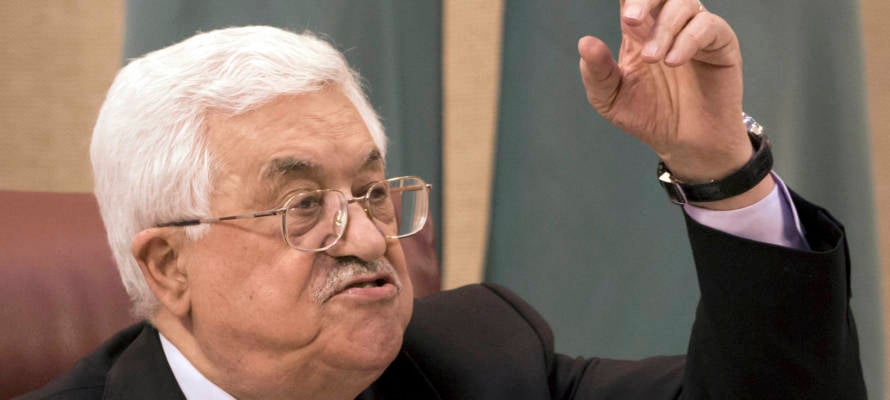Palestinian Authority President Mahmoud Abbas recently refused a request from four Arab states to name a successor because he will only pick someone who will preserve his sons’ business empire.
Writing for the Jerusalem Center for Public Affairs, longtime Arab affairs correspondent Yoni Ben Menachem claims Palestinian Authority President Mahmoud Abbas, 81, rejected a request from Egypt, Jordan, Saudi Arabia, and the United Arab Emirates to allow longtime rival Mohammed Dahlan to return from exile and prepare to be his successor. (Dahlan, the PA’s one-time Gaza security chief, wasexpelled from Fatah, the party headed by Abbas, after being charged with corruption in 2011.) Some Fatah members believe that Abbas’ refusal to accept Dahlan as an heir apparent, and choosing instead to mollify Egypt and Jordan by cancelling local elections, was “political suicide.”
In the midst of intrigue over the succession process, “interested parties” began leaking details about the Abbas family’s corruption, Ben Menachem wrote. Egyptian journalist Hussein Yousef published a report earlier this week laying out allegations against Abbas and his sons Tareq and Yasser.
According to the Egyptian report, Abbas uses his ties with nations and international businesses to give a boost to “Falcon,” the consortium owned by his sons. Falcon “has taken over the West Bank’s commerce and its labor market,” Ben Menachem reported, and is benefiting from favorable condition Abbas has arranged for it at the expense of other Palestinian businesses. The industries Falcon is involved in include tobacco, electricity and mechanical contracting, media, investments, and insurance.
Mohammed Rashid, who had been Yasser Arafat’s economic adviser, told Yousef that Abbas has misappropriated more than $100 million. Yousef added that Tareq Abbas has also smuggled antiquities and sold them abroad.
Dahlan, for his part, has accused Abbas of personally keeping some $600 million of $1.4 billion that Arafat had transferred to him. Dahlan also claimed that he had arranged $5,000 dollar per month PA jobs for Yasser and Tareq, who are now estimated to be worth around $300 million. Many of the details of the Abbas family corruption were exposed in the so-called “Panama Papers” earlier this year. Grant Rumley, a research fellow at the Foundation for Defense of Democracies, warned in May that the West’s refusal to challenge the growing corruption and autocratic rule under Abbas “could have a devastating effect on the long- prospects for a viable Palestinian state.”
The bad blood between Mahmoud Abbas and Dahlan means that appointing Dahlan as a successor “would likely be to the Abbas sons’ detriment in the future,” Ben Menachem wrote. Abbas was said to prefer lead peace negotiator Saeb Erekat to be his successor, but Erekat, who is broadly unpopular, took himself out of the running after facing stiff opposition from Fatah Central Committee member Jibril Rajoub, who envisions himself as the best possible successor. Gen. Majid Freij, who is the head of Palestinian General Intelligence and close to Abbas, is also thought to be a candidate, but Abbas hasn’t promoted him or otherwise publicly indicated his approval, fearing that Arab states would oppose naming him instead of Dahlan.
Polls show that many Palestinians want Abbas, who is currently serving the 11th year of a four-year term, to resign. Abbas established a new court system in April to further consolidate his power. The Times of Israel reported that the PA saw the now-cancelled municipal elections as a first step toward holding new presidential and national elections within two years, which would legitimize the rule of Abbas or his successor.
Leaders of both Fatah and Hamas have complained that they are being harassed by authorities under control of their rivals. Veteran Palestinian affairs correspondent Khaled Abu Toameh reported last month that both the PA and Hamas were seeking to silence critics ahead of elections. The ongoing crackdown on journalists in the West Bank and Gaza reflects the insecurity of their ruling authorities, Abu Toameh charged. “The less politically secure they feel, the more they strip Palestinian journalists of their ability to report how things really stand,” he wrote.
By: TheTower.org
Do You Love Israel? Make a Donation to Show Your Support!
Donate to vital charities that protect Israelis and help inspire millions around the world to support Israel too!
Now more than ever, Israel needs your help to fight and win the war -- and also the battle of public opinion.
Anti-Israel bias and boycotts are out of control. Israel's enemies effectively use social media to incite brutal terror against innocent Israeli civilians. Please help us fight back!




